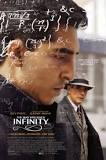Contribute
| In Conversation With Matthew Brown, Director, The Man Who Knew Infinity |
Nirmala Garimella
05/05/2016
(This article is sponsored by Tanna Insurance)
The Man Who Knew Infinity is a 2015 British biographical drama film based on the 1991 book of the same name by Robert Kanigel. The film stars Dev Patel as the real-life Srinivasa Ramanujan, a mathematician who after growing up poor in Madras, India, earns admittance to Cambridge University during World War I, where he becomes a pioneer in mathematical theories with the guidance of his professor, G. H. Hardy (played by Jeremy Irons).
Filming began in August 2014 at Trinity College, Cambridge. The film had its world premiere as a gala presentation at the 2015 Toronto International Film Festival,and was selected as the opening gala of the 2015 Zurich Film Festival. It also played other film festivals including Singapore International Film Festival and Dubai International Film Festival.
Distinguished mathematicians Manjul Bhargava and Ken Ono are Associate Producers of the film. Ono, the mathematics consultant, is a Guggenheim Fellow, and Bhargava is a winner of the Fields Medal.
I talked to the Director, Matthew Brown over the phone on the making of the film that is currently running at Coolidge and Kendall Square cinemas for a limited time only. Dont miss the opportunity to see it.
While making the film, what struck you the most on Ramanujam's character that many of us are not aware of ?
I think that what struck me most about him was his confidence. While we know he was humble in nature from his own writings, he was also very very driven. He stood up GH Hardy and was not afraid to stand behind his theorems even without proof. That he would have the courage to go to England at such a harsh time during the height of colonialism is a tribute to his character and his bravery. Imagine coming from Madras to the pinnacle of intellectual though at Trinity and to hold his own and more, it really is inspiring. This was the first film that Trinity allowed to shoot on its campus, not even Chariots of Fire, and I think that says a lot about what high esteem his legacy is held there.
As a filmmaker how challenging was it to make a film on the subject which is is quite complex. Does it make it easy for the audience?
I don't think any of us who are not mathematicians can ever fully appreciate the pure mathematics that Ramanujan did, but what we can appreciate is the passion he had as an artist, and pure mathematicians are artists in their own right. We focus on his work in partitions, and on the face of it, an audience can understand the challenge. At the heart of the film is the human story and the mathematics and partitions play more as subtext to this important inspirational story of overcoming racism, and mutual respect and friendship that comes between Ramanujan and GH Hardy.
Was this the first time you shot in India ( Chennai) ? Can you share your experience?
The first time I shot in Chennai was overwhelming. The crew had us do a prayer ceremony before we began and I think I may make this a new tradition for me going forward with other films. It was a real challenge to create 1914 Madras in 2015 Chennai. It is such a modern city now. We so wanted to be authentic that when we were unable to find a traditional Iyengar Brahmin street in Chennai that would have resembled the period, we ironically travelled six hours to Kumbakonam, Ramanujan's home town, where we found one! This is also one of the first Western international films to use all South Indian musical instruments, such as morsing, when he cuts his Kuthumi knot. And with costumes we used the nine yard saris. So we tried to make it as authentic as possible, but we were not able to have the actors speak Tamil as even the Indian ones did not speak it.
As a Director shooting with so many cultural challenges in the mix what are your takeaways?
I think it really restores my faith in humanity. I have great respect for the Indian crews. We had a very different rhytmn shooting in UK and India.As a director from the US, people were sceptical in India when I started out on making this film. Over time however, we got to know one another and gained mutual respect. Many have been championing the film.
What is the message you want to convey with this film ?
The message I want to convey is that talent can exist anywhere and it needs to be nurtured. We can not be closed off individually or as a society if we want to recognize and develop the best talent, because it can exist anywhere, and in any race or gender.
What has been the response to the film so far?
As for the reception it has been overwhelmingly positive with audiences who have been very moved by the film and that is incredibly rewarding. It has been a 12 year journey to make the film, a real passion project, so it is thrilling to see people from all backgrounds being affected by this little independent film. It looks bigger than it is, but that was just from a lot of people caring and going the extra mile to tell this story.
You may also access this article through our web-site http://www.lokvani.com/

